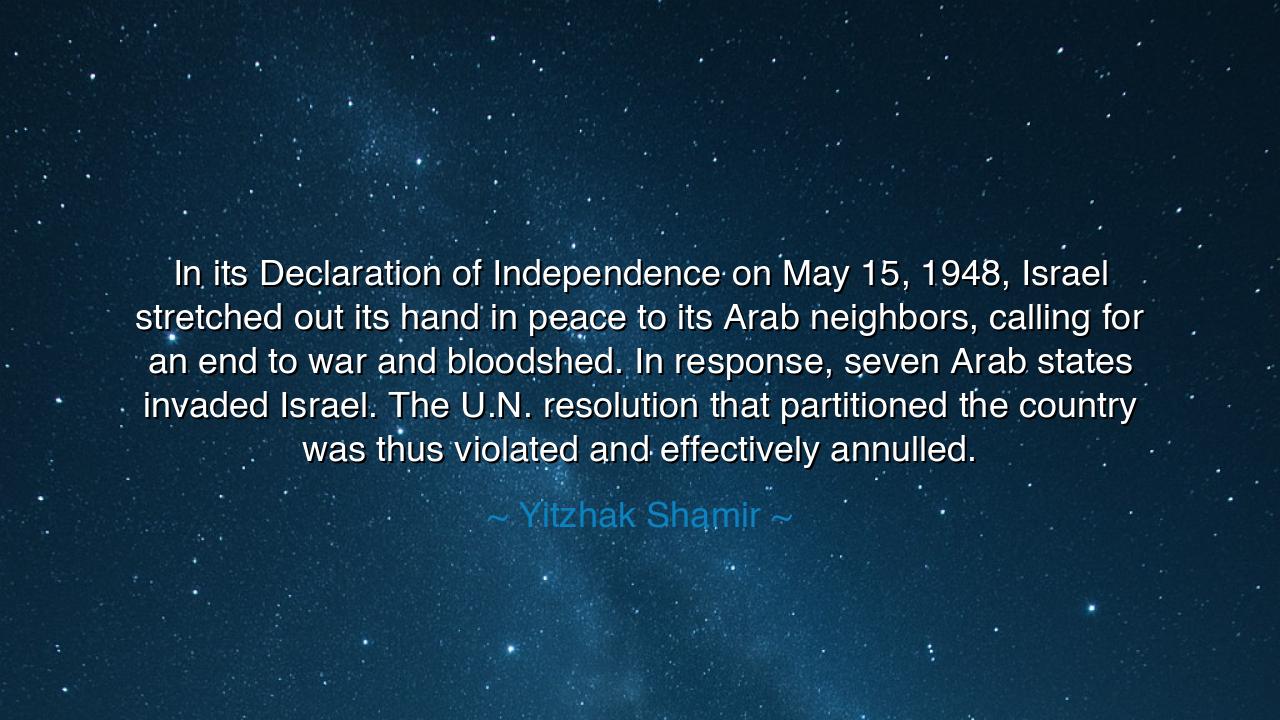
In its Declaration of Independence on May 15, 1948, Israel
In its Declaration of Independence on May 15, 1948, Israel stretched out its hand in peace to its Arab neighbors, calling for an end to war and bloodshed. In response, seven Arab states invaded Israel. The U.N. resolution that partitioned the country was thus violated and effectively annulled.






"In its Declaration of Independence on May 15, 1948, Israel stretched out its hand in peace to its Arab neighbors, calling for an end to war and bloodshed. In response, seven Arab states invaded Israel. The U.N. resolution that partitioned the country was thus violated and effectively annulled." – Yitzhak Shamir
Hear these words, O inheritors of history, for they carry both sorrow and resolve — the eternal tension between peace offered and war returned, between the yearning of nations to live in harmony and the tragic blindness of fear and pride. When Yitzhak Shamir, one of Israel’s founding statesmen, spoke these words, he did not seek to accuse alone; he sought to remind the world that even in its birth, Israel extended the olive branch before it lifted the sword. For the essence of this quote is not merely political, but deeply human — that peace, though offered with sincerity, is not always embraced, and that sometimes the path of survival must pass through fire.
The origin of this moment lies in the turbulent dawn of a new state, when the people of Israel, after centuries of exile and persecution, stood upon the soil of their ancestors and declared their independence. Their Declaration of Independence, spoken on May 15, 1948, was not only a proclamation of sovereignty but an appeal to conscience. In that declaration, Israel “stretched out its hand in peace,” calling upon its Arab neighbors to build together a future free of hatred and bloodshed. Yet, within hours, armies from seven Arab nations—Egypt, Transjordan, Syria, Lebanon, Iraq, Saudi Arabia, and Yemen—marched upon the newborn state, determined to extinguish it before it could draw its first breath.
Thus, Shamir’s words are a lament carved from reality: that the promise of peace can be shattered by the clamor of war. The U.N. resolution, which sought to divide the land between two peoples, was cast aside, and what might have been coexistence descended into chaos. Israel, a nation barely born, found itself surrounded, outnumbered, and alone. Yet from that trial by fire, a people emerged not destroyed but forged — tempered like steel in the furnace of necessity. They did not seek conquest, but survival; not domination, but the right to live in peace.
History, alas, repeats this pattern often. Recall the ancient story of Rome and the Carthaginian wars. After the first great conflict, when Carthage lay weakened, it sought peace and trade, offering tribute and goodwill. But Rome, driven by suspicion and pride, answered not with mercy but with annihilation. By destroying Carthage, it believed it ensured safety — yet in truth, it sowed the seeds of its own decline, for no victory gained through hatred can endure. The lesson is the same: when peace is offered and war is chosen instead, it is not only treaties that are broken, but the moral order itself.
Yitzhak Shamir, once a fighter and later a leader, understood that peace without truth is fragile, and that freedom without vigilance is fleeting. His words remind us that while the hand of peace must always be extended, it must also be defended. To seek reconciliation does not mean surrendering the right to exist; to protect one’s people is not to reject peace, but to honor it. In the fires of 1948, Israel learned that the price of life is eternal watchfulness — yet it also learned that even in defense, one must never lose the longing for peace.
From this tale arises a timeless lesson for all generations: when you offer peace, do so with sincerity and courage; when you face hostility, stand firm but do not let hatred consume your heart. The world is full of those who mistake kindness for weakness, yet true strength is born from the balance of mercy and resolve. If peace is rejected, let it not harden your soul; instead, let it deepen your understanding of the fragility of human hearts.
So, to all who hear this teaching: extend your hand as Israel once did, in good faith and without malice. But if that hand is struck, do not despair. Stand tall, defend what is sacred, and remember that justice and endurance will outlast the roar of armies. For as Yitzhak Shamir’s words remind us, peace offered and refused still holds the moral high ground, and the people who walk that path — though tested by war — carry within them the undying light of perseverance, hope, and truth.






AAdministratorAdministrator
Welcome, honored guests. Please leave a comment, we will respond soon